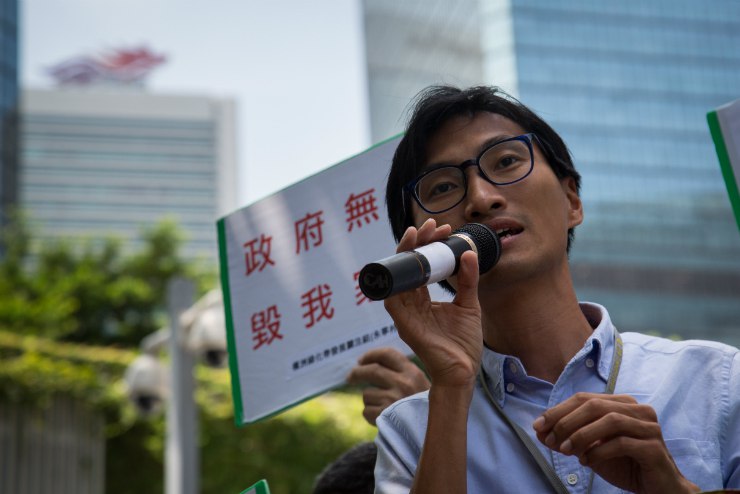Lawmaker-elect Eddie Chu Hoi-dick has slammed the government for conducting informal discussions with district leaders instead of carrying out open public consultations on development plans in Yuen Long. He said that the government’s tactics meant villagers affected by the plans were never consulted.
Chu and Edward Yiu Chung-yim, architectural sector lawmaker-elect, met with Secretary for Development Paul Chan Mo-po and Secretary for Transport and Housing Anthony Cheung Bing-leung on Thursday. They talked mostly about the Wang Chau public housing plan, a key issue in Chu’s election platform.
Citing Cheung, Chu said the government only informally met with the then-Yuen Long district council chairman Leung Che-cheung and other rural committee leaders in 2013 – before the proposal was submitted to the district council. But the government was unable to reveal records of such informal discussions, as records may not exist.

“They only discussed things with those in power, thinking that they can represent the villagers – this is very ridiculous,” Chu said.
Yuen Long land debacle
The 2012 public housing plan for Wang Chau, Yuen Long was originally set to provide 17,000 units – but in, 2014, the plan shifted to provide 4,000 units on a nearby piece of greenbelt land. The new plan would see over a hundred residents of three villages forced to move by January 2018. Yet the villagers said they were never consulted.
Recently, the government stated that the remaining 13,000 units would still be built and that the delayed construction phase is to be undertaken on a piece of land that has been transformed into a car park operated by Ping Shan Rural Committee Chairman Tsang Shu-wo.
But Chu cited a speech made by Tsang to the Yuen Long district council in June 2014. In it, Tsang praised the Housing Department for consulting the Ping Shan Rural Committee and subsequently reducing the size of the project. Chu suggested the 13,000 units had already been dropped at that time.
He criticised the government for backpedaling in order put forward a “story” that it had never dropped the development of the car park, though Cheung denied it.

Alleged developer involvement
After plans to develop the car park was temporarily halted, Chu claimed that a land developer soon applied to build flats on another plot of greenbelt land close to the villages.
As the land was uninhabited, Chu asked the minister why it could not be developed into public housing.
He claimed that informal talks with rural leaders would also help developers, who may share their interests. Cheung, however, said developers were not included in the talks.
“Such non-transparent informal talks make us wonder whether there was any communication between the government, developers and rural groups – we still have doubts,” he said. “But from the result, we can see that the uninhabited greenbelt land – owned by developers – was not turned into public housing.”
“Who they have the under table discussions with could prove the presence of collusion between the government, businesses, rural groups and triads.”
He said he cast strong opposition to such talks during the meeting.

No collusion
Meeting the press, Cheung said such talks were common, and it was not a matter of “colluding” with rural committee leaders and the district council chairman.
“The government would want to hear the preliminary reactions from the area,” Cheung said. “For example, I had breakfast with a lawmaker as a minister to discuss some things – there may not be any record.”
He added that such informal talks did not form the actual and final development proposal, as it was only completed a year later.
Cheung said that for a project like Wang Chau, which only provided around 10,000 units, the government would only conduct informal talks, unlike with larger projects.
But Chu rejected such claim: “A project for some 50,000 people to live in, such a large scale… it is strange no public consultation was done.”
Asked whether he would meet the villagers, Cheung said that he would first need to understand what topic was to be discussed.

Redacted reports
Chu also said he and Yiu demanded the government release the feasibility reports of the Wang Chau development project in full.
Chu quoted Cheung as saying that the reports, a set of more than ten, would be released when sensitive land information was redacted. The process may take some time.
But Cheung promised that the covers, the indexes, and the scope of research of the reports would be made public on Thursday.
Parts of the land for the potential 13,000 units – now turned into a car park – was government-owned land which is being illegally occupied.
Citing Cheung, Chu said 1.2 hectares of the government land would be rented to the occupier, and the government reserved its right to claim the rent for previous occupation.
Yiu said he was told the government took “large scale action” at the car park site in April, but it was too short-staffed to enforce the law in the past.
Yiu added they would ask further questions about the reclaiming process of the government land and the renting procedures. The government will also arrange inspections at the sites in three months.
